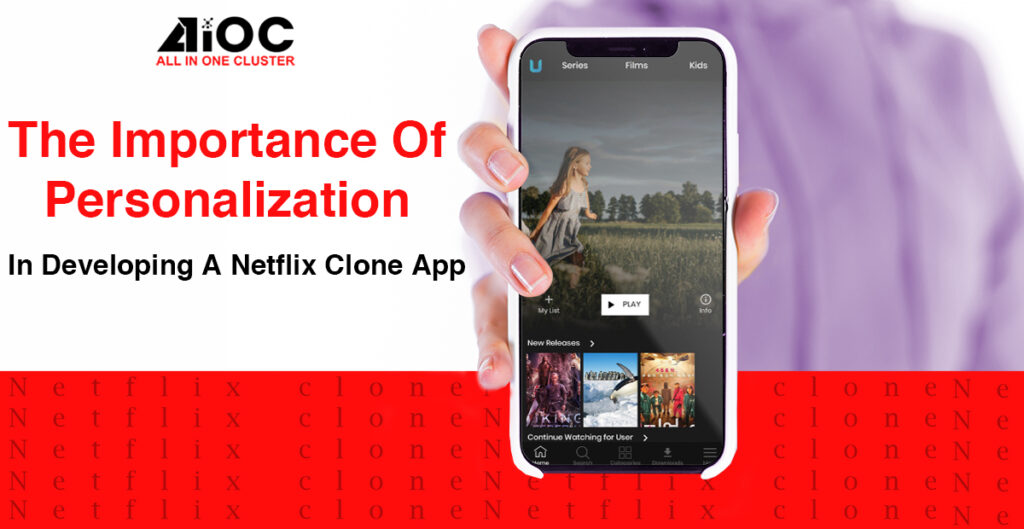Netflix, the preeminent streaming platform in the world, has revolutionized the way in which individuals consume their entertainment. The company’s unparalleled prosperity can be accredited to its adeptness in personalizing the user experience, thereby furnishing viewers with tailored content recommendations based on their viewing history, search queries, and preferences.
This level of personalization proves to be of paramount significance when constructing an app that emulates Netflix. Within this discourse, we will delve into the importance of personalization in crafting a Netflix clone app.
Understanding Personalization in Netflix
Personalization pertains to the process of fashioning experiences, products, and amenities that are specifically customized to cater to the distinct demands of customers. Netflix has effectively achieved this feat by implementing a fusion of user data and sophisticated artificial intelligence algorithms. Through the collection and scrutiny of user data, including viewing history, search queries, and watch lists, the platform can furnish personalized content recommendations that are tailored to suit the individual proclivities of each viewer.
Netflix’s intricate algorithms take into account various determinants when generating recommendations, encompassing the user’s preceding viewing conduct, their favored genres, the hour of the day they typically watch, and the particular devices they utilize to stream content. This remarkably personalized approach yields a more gratifying and captivating viewing experience, which, in turn, leads to amplified user contentment and allegiance.
The Importance of Personalization in Developing a Netflix Clone App
Personalization plays a pivotal role in the development of a Netflix replica application. There are sundry reasons for the significance of personalization. Primarily, personalization fortifies user engagement by presenting content that corresponds to the viewer’s preferences. Hence, when presented with content that aligns with their interests, users are more prone to interact with the app. This level of engagement can culminate in amplified viewing time, retention rates, and customer satisfaction, thereby leading to success in the long run.
Moreover, a bespoke user experience immensely ameliorates the overall user experience. In other words, providing users with content that caters to their interests positively impacts their experience with the app. Consequently, this positive experience can metamorphose into elevated user loyalty and a higher probability of recommending the app to others.
Likewise, personalization can also conduce to augmented revenue. The rationale behind this is that when users engross with the content, they are more likely to subscribe to the service, rent, or purchase the content. This increased revenue can assist in making the app more profitable and sustainable in the long term.
Furthermore, personalization furnishes invaluable user data that developers can leverage to upgrade the app’s performance. By accumulating user data on preferences and behavior, developers can procure insight into users’ preferences and dislikes regarding the app. Subsequently, this intelligence can be utilized to enhance the app’s features, user interface, and content recommendations.
Fundamentally, amalgamating personalization into a Netflix replica application is critical for achieving success in the cutthroat video streaming market. By tailoring the user experience and presenting personalized content, the app can enhance user engagement, satisfaction, and revenue while simultaneously gathering invaluable data to improve performance.
How to Personalize a Netflix Clone App?
To achieve personalization in a Netflix clone app, there are various methods that can be employed. One such approach involves requiring user registration, which permits the app to amass data on the user’s viewing history, preferences, and search queries. This data can then be leveraged to offer content recommendations tailored to the user’s needs.
Another essential aspect of personalization is viewing history. By scrutinizing a user’s viewing history, the app can gain valuable insights into the user’s preferences and make personalized recommendations accordingly. Viewing history can also be employed to generate watch lists and continue watching lists, thus simplifying the user’s content discovery process.
Search queries are another valuable source of data that can be utilized for personalization. By analyzing search queries, the app can discern what types of content users are looking for and make personalized recommendations based on those queries.
Ratings and reviews can also provide valuable data for personalization. By analyzing user ratings and reviews, the app can determine what types of content users enjoy and dislike, and use that data to offer personalized recommendations and improve the content provided to users.
Machine learning algorithms play a vital role in personalizing a Netflix clone app. These algorithms scrutinize user data and offer personalized content recommendations based on that data. They also learn from user behavior over time, offering increasingly precise recommendations.
The user interface also plays a crucial part in personalization. The app should provide a customized home screen that displays content recommendations based on the user’s preferences and viewing history. The interface should also facilitate content search and enable users to create watch lists.
Push notifications can also be used to provide personalized recommendations. The app can send notifications to users when new content becomes available that matches their preferences or when content they have expressed interest in becomes available.
Conclusion
The creation of a Netflix-like app depends on personalization. It contributes to more user engagement, better user experience, increased income, and the provision of useful user data. Developers may employ a variety of tools, including user registration, watching history, search queries, ratings and reviews, machine learning algorithms, user interface, and push notifications, to customise a Netflix clone app. Developers may build a successful streaming software that interacts with consumers and entices them to use it again by placing a high priority on personalization.
